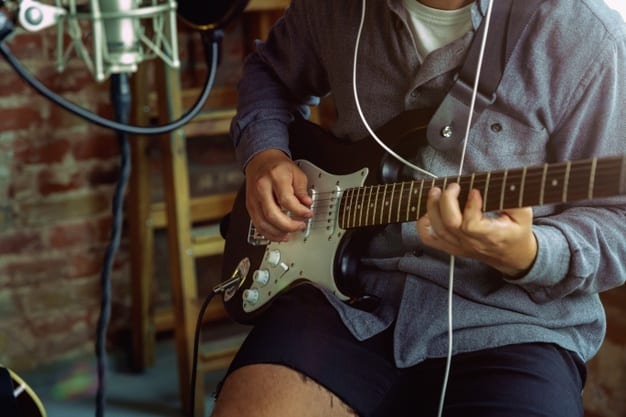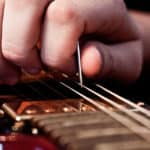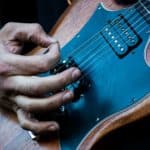The guitar has always been the most famous among the popular instruments.
It is common to find people that are eager to learn how to play this stringed piece.
It is an attractive and versatile instrument because of its adaptability, you can play the rhythm or even melodic parts like those emotive solos we all remember from our favorite songs.
What is more, there are two alternatives to the same instrument: acoustic or electric.
Beginners tend to choose acoustic guitar because of its immediacy (you take it and play) but many, after some months prefer to continue their journey with an electric.
So, a question must be answered: Is it easy to transition from acoustic to electric guitar?
Transitioning from acoustic to electric guitar is actually simple. Electric guitars are easier on the fingers, usually smaller, and more comfortable to play with. Also, because both instruments share tunings and mechanics, all your knowledge will easily transfer. You can start playing right away.
The two of them share standard tuning so chords, shapes, and scales are the same.
Also, although there are some new skills to learn, the techniques applied are very similar.
Through this article, I will try to point out what you can do to make this transition smoother.
Would all my skills translate from the acoustic to the electric guitar?
As I have already mentioned, acoustic and electric guitars have similar techniques. What is important to bear in mind is that in electric guitar there are new skills to develop apart from those applied on acoustic.
Although bending is also used in acoustic pieces, it suits the electric better. Since the string tension is lower, bending is more accessible on the electric guitar. That’s why you can get wonderful sounds that enrich your playing.
Sweep picking is a new technique relegated to electric guitar. It consists of playing single notes on consecutive strings using a pick while your playing hand produces fast and fluid sounds.
Another issue to take into account is the need for an amp. You will have to get used to using an amplifier and effects such as distortion or overdrive as well.
At first, it may be complicated but you will get along with them.
Things that will be easier if you have an acoustic background
Your acoustic background will be useful if you move to the electric guitar. The string gauge (and tension) of acoustics is higher so your fingers will already be strong enough to play.
As both sorts of guitars share tuning and the techniques are similar, you will know how the instrument works. What is more, since you have been playing the instrument, you will have the proper coordination.
Another remarkable aspect is the speed. As your fretting hand is used to some mechanical movements, it will be faster getting up to speed.
Things that will be a hurdle if you have an acoustic background
On the other hand, there are specific aspects relegated to electric guitars that will be hard to master but not impossible. Needless to say, you will have to struggle with issues such as tweaking the amp or the electric guitar hum.
In addition, the effects play an important role in electric instruments. You will be able to achieve a fascinating sound through them but you have to be careful with effects such as distortion.
The strings may produce annoying noises when playing with distortion and this will definitely be something to get used to.
Last but not least, in opposition to its counterpart, you have to plug the electric guitars in to play.
This is because of how they are built, acoustic guitars are hollow-bodied so the sound comes from the hole whereas in electric guitars the sound is received by the pickups and translated into sound by the amp’s speaker.
How long will it take to get used to the electric guitar?
Having an acoustic background, it wouldn’t be hard to become accustomed to the electric guitar. Actually, you can start to play straight away but it will take you some months to feel really comfortable with it.
The most relevant features are lap comfort and finger playability. The first is how comfortable a guitar feels in your lap when playing.
Electric guitars feel usually more comfortable because they are slimmer. Contrarily, acoustic guitars tend to be bulky and this makes them less comfortable.
As regards finger playability, it varies depending on the instrument.
The good thing is that, as I mentioned earlier, acoustic guitar strings are harder to deal with due to their higher gauge and tension.
Electrics are way easier on the hands because their thinner strings and lower action are more forgiving, and require less force to be fretted.
Through practice, you will get used to the electric guitar earlier than you think.
Would you need to learn how to play with a pick?
Most electric players prefer to use a pick but it is not the only option.
You can play with your fingers, with a pick, or even apply a technique called hybrid-picking, which consists of combining fingerstyle with picking.
Besides, each choice will make your sound different.
By playing with a plectrum, your sound will be aggressive and sharp but if you apply fingerpicking, you will get a soft warmer tone.
If you want to learn about this issue deeply, take a look at the articles on this site.
Is the electric guitar louder?
In fact, we cannot say that electric guitars are louder than acoustic. Electrics don’t actually produce a strong acoustic sound.
If you play unplugged in a quiet room, you could listen to it but in the short term, you will require an amp.
To be honest, most solid body electric guitars sound awful when unplugged.
What actually happens is that you can control the output volume with the amp.
And it can easily range from something quieter than an acoustic to something that your neighbors will surely not enjoy.
However, how hard you hit strings is still a factor that defines loudness and dynamics.
Is an amp absolutely necessary for learning the electric?
The electric guitar’s potential lies in its full sound.
This can be achieved by plugging it in, that’s why amps are extremely important.
Although you have alternatives such as regular speakers, software, or even headphones, an amp would be the best choice because it is a plug-and-play solution.
You can get a good cheap amp perfect for practicing at home.
We also have articles about this topic, I suggest you give a glimpse.

Hello there, my name is Ramiro and I’ve been playing guitar for almost 20 years. I’m obsessed with everything gear-related and I thought it might be worth sharing it. From guitars, pedals, amps, and synths to studio gear and production tips, I hope you find what I post here useful, and I’ll try my best to keep it entertaining also.





